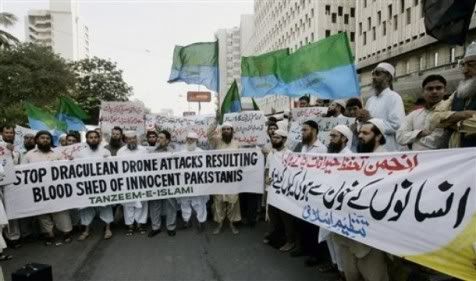The recent visit to Pakistan by the U.S Special Envoy Richard Holbrooke and Admiral Mike Mullen highlighted the growing differences between Pakistan and the United States on how to tackle the threat of Pakistani Taliban. At another level, their visit also signified an emerging consensus between Pakistan’s political leadership and security establishment that it can not afford to give in to the U.S. demands and need to chart a different course.

As a recent Dawn editorial noted, the visiting U.S. team was taken aback by the tone of Pakistani officials. Instead of arm-twisting Pakistan into agreeing to joint military operations in the tribal areas, they were confronted with a barrage of criticism and the visit ended with a rare and public acknowledgment of the differences between the two sides. While the PML-N chief Nawaz Sharif has been forceful in his opposition to these attacks for quite some time, it appears that the Prime Minister Gilani, President Zardari and the COAS Gen. Kiyani has finally thrown their weight behind this argument. Also a recent report from the bipartisan National Security committee condemned such attacks in the “strongest possible manner”.
Ironically its the Americans that deserve most of the “credit” for causing this convergence of thinking in Pakistan. A sustained campaign of charges in the U.S. press against the ISI for its alleged links with militants led by the senior U.S. Generals coupled with the threat of an expansion in drone attacks to cover Baluchistan and settled parts of Pakistan has finally convinced the national leaders to come out against the U.S. plans. Pakistan is also frustrated at the United States for its failure to make Pakistan’s strategic interests in Afghanistan a part of its new strategy for the region.

While it is too early to know if Pakistan can put up enough resistance to stop these attacks by unmanned aircrafts, it is good to see the change in nation’s attitude. Sovereignty is something that you either use or loose and in the case of Pakistan, we have opted for the later for the past 8 years. No one can deny the emerging threat of Taliban emanating from Pakistan’s tribal belt yet no sovereign country can allow such attacks by a foreign power. The western media often cites the killing of high-level Taliban and Al-Qaeda leaders to justify such tactics but they often fail to recognize the impact of such attacks at the strategic level: in addition to the backlash caused by the civilian casualties, these attacks put Pakistan government and army in an impossible situation that they can’t possibly cope with. They have also caused the Taliban to move eastwards into the more settled areas where such attacks are not possible due to population density. A recent report in the Foreign policy magazine summarized the situation as follows:
The US administration justified the drone attacks by claiming it would deny the militants a ‘safe haven’ in Pakistan.‘This line of argument sounds persuasive, but it falls apart on closer examination. For starters, it is not clear that al Qaeda requires a safe haven to do damage, especially since the original organisation has metastasised into smaller groups of sympathisers.’
The magazine pointed out that only a large-scale invasion could eliminate al Qaeda from the region but such an invasion was impossible and therefore there was little reason to continue the drone attacks.
‘US military strikes in Pakistan —even limited ones —tend to undermine the Pakistani government and increase the risk that Pakistan will become a failed state,’ the report noted.



















































While there has been widespread condemnation of the Taliban imposing Shariah Law and justifiable outcry against the flogging of a teenage girl in Swat by the Western and Pakistani media, there’s been a very little reported about the Taliban’s popular war on the landed elite in Swat. The emerging accounts from Pakistanis who have fled Swat now make clear that the Taliban seized control by pushing out about four dozen landlords who held the most power in the former princely state. It also explains why the soldiers and policemen refused to fight on behalf of the landlord politicians against the Taliban who are supported by their oppressed brethren.
http://www.riazhaq.com/2009/04/taliban-target-paki stans-landed-elite.html
While there has been widespread condemnation of the Taliban imposing Shariah Law and justifiable outcry against the flogging of a teenage girl in Swat by the Western and Pakistani media, there’s been a very little reported about the Taliban’s popular war on the landed elite in Swat. The emerging accounts from Pakistanis who have fled Swat now make clear that the Taliban seized control by pushing out about four dozen landlords who held the most power in the former princely state. It also explains why the soldiers and policemen refused to fight on behalf of the landlord politicians against the Taliban who are supported by their oppressed brethren.
TALIBAN are the bad seeds, pakistanies should be thankfull to americans that they are killing them, i have met many pakistanies who are against drone attacks but they never could bring a shread of logic why drone attcacks should not happen.
Pakistani leadership and people have failed to do justice to Pakistan. External and internal threat to Pakistan should be met with force and we just look the other way.
Orakzai
http://ibnlive.in.com/news/taliban-execute-couple- for-illicit-relationship/90550-2.html
Orakzai: Taliban militants executed a man and a woman in public on charges of having illicit relations. The couple was shot with Kalashnikovs in front of their relatives, in Hangu district of troubled North West Pakistan.
The shocking footage of the shooting incident which took place a few days back near the border of Orakzai Agency was made available to a Pakistani media outlet on Friday, the Dawn News channel reported.
The footage made available to Dawn showed the Taliban shooting the man, aged around 40 and a woman, who is about 45 years old, in an open space in the presence of their relatives and a large crowd.
In the footage, the woman was heard appealing to the Taliban,